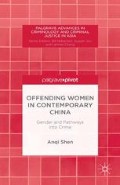Abstract
This chapter highlights two major theoretical perspectives that are relied on in this study. Firstly, the empirical data are contextualised within the broader socioeconomic contexts as a result of neoliberal policy and practice in post-Mao China; and secondly, the gendered nature of this study is focused on examining three categories of female offenders, their conditions in life, and their positions in crime, which have been shaped by the criminogenic effects of neoliberalism. The fact that despite varied personal circumstances all the respondents were motivated by powerful economic incentives helps establish a causal link between the social status and situated conditions of the female law-breakers and female criminality in the twenty-first century.
Access this chapter
Tax calculation will be finalised at checkout
Purchases are for personal use only
Preview
Unable to display preview. Download preview PDF.
Author information
Authors and Affiliations
Copyright information
© 2015 Anqi Shen
About this chapter
Cite this chapter
Shen, A. (2015). Conclusion. In: Offending Women in Contemporary China: Gender and Pathways into Crime. Palgrave Advances in Criminology and Criminal Justice in Asia. Palgrave Pivot, London. https://doi.org/10.1057/9781137441447_6
Download citation
DOI: https://doi.org/10.1057/9781137441447_6
Publisher Name: Palgrave Pivot, London
Print ISBN: 978-1-349-49479-8
Online ISBN: 978-1-137-44144-7
eBook Packages: Palgrave Social Sciences CollectionSocial Sciences (R0)

